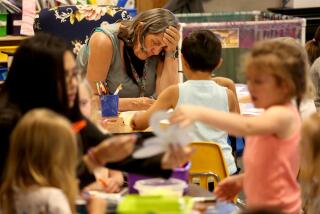Giving Teachers a Helping Hand
- Share via
“One hand for the ship, one hand for yourself” is an old watchword in the U.S. Navy that offers advice to sailors about to clamber up a ship’s rigging. If sailors climb to their stations and only hang on for dear life, no work is done. If they don’t hold on, they are lost. When individuals only take care of themselves, the work of the ship -- or society -- suffers. But if individuals don’t save one hand for themselves, they will founder.
Teachers should consider this maritime message. Too many young teachers give both hands to the job, sacrificing their personal lives and even their health to the demands of their classroom: designing lessons, calling parents, staying late, arriving early and grading papers into the night. As a result, the best and the brightest often decide they want a less restrictive life and leave the profession. This is not to say that only inferior specimens remain. This is my 31st year in the classroom, yet I considered applying to law school after four years of teaching. Fortunately, two things happened. My husband asked a few pointed questions. “Do you really want to be a lawyer?” (“No.”) “Then why do you want to go to law school?” I had no answer.
I also became involved with the National Writing Project. I accepted an invitation to attend a summer California Writing Project Institute session at UCLA. Instead of reaching outside education to broaden my horizons, I embraced a wider professional community.
To this day, I feel guilty about the lack of professional capital I brought to that writing community. My fellow participants were experts in the field, grappling with issues of rhetoric and composition. I wasn’t entirely sure what “rhetoric” was, and I still split infinitives.
Ruth Mitchell, Dick Dodge, Rae Jean Williams, Diane Dawson, Genee Gossard and others never made me feel stupid, however. They welcomed me into their world, where sharing ideas for improving writing instruction was a way of life.
No one person had all the answers. We heard from experts and worked through each other’s writing lessons. Over the course of those five weeks, I learned pedagogical strategies that would help me retain my balance in the high-wire act of classroom teaching. I also experienced the power of professional friendships.
Richard Ingersall’s research report “Is There Really a Teacher Shortage?” cites statistics on teacher attrition that show that 40% to 50% or more of new teachers leave the profession during their first five years.
His implications for policy are clear: “In short, the data suggest that school staffing problems are rooted in the way schools are organized and the way the teaching occupation is treated and that lasting improvements in the quality and quantity of the teaching workforce will require improvements in the quality of the teaching job.”
The problem is not that too few teachers are entering the profession or that too many teachers are retiring. Individuals choose to leave teaching because they are unhappy with their teaching lives.
If schools hope to retain promising young teachers -- the kind who will go on to be future leaders in the profession -- they need to help one another figure out how to maintain “one hand for the ship, one hand for yourself.”
Whether or not formal mentor programs are in place at a school, experienced teachers need to reach out to the new teachers not only with the offer of their files but also with a hand. Talk without shame about how to handle the paper load. Offer paper-grading sessions where teachers work together. Publicize sample student papers so teachers feel comfortable about their grading standards. Urge schools to reduce the size of writing classes. Channel supplemental funding sources to tutoring and outside readers.
The biggest problem facing American education is not the shortage of teachers but rather the shortage of good teachers. Schools don’t need more martyrs. They need professionals who can survive and thrive in a challenging job.


